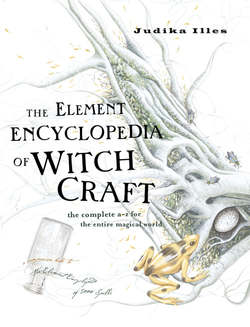Читать книгу The Element Encyclopedia of Witchcraft: The Complete A–Z for the Entire Magical World - Judika Illes - Страница 113
Datura (Datura spp.)
ОглавлениеDatura names a widely distributed family of herbaceous shrubs with fragrant, trumpetshaped flowers and usually spiny seedpods. There are approximately 20 species of datura growing around the world. Common folk names include angel’s trumpet, devil’s trumpet, devil’s herb, horn of plenty, Jimsonweed and thorn apple. Many datura species have beautiful white flowers that bloom only at night, closing during the day—thus the plant possesses a profound lunar affiliation. Datura is cultivated for these beautiful flowers and various species remain staples of California’s botanical nurseries.
Most species of datura are indigenous to the Western Hemisphere, however several originated in Eurasia, most probably in the region around the Caspian Sea. It is abundant in Russia from the Black Sea regions through Siberia, but thrives everywhere with the exception of very cold regions. Datura is used ritually wherever it is found, including widespread regions of Africa, China, India, Mexico, and the North American southwest. Remains of seeds and seedpods found within a ritual context in South Texas, together with remains of other psychotropic plants, have been dated back to 2000 BCE.
Datura is used to hex and to break hexes, to induce sleep and visionary dreams. It has historically been used to communicate with other species, especially birds, and to enter other realms, especially that of the after-life. Unfortunately, it may be a one-way trip. Datura is deadly poisonous. Its active ingredient is hyoscyamine, which is similar to atropine but has a more powerful effect on the peripheral nervous system, causing powerful hallucinations.
Thorn apple is the form of datura most familiar in Western magic. Thorn apple (Datura stramonium) has been known in Europe since the sixteenth century, apparently introduced by the Romany who are believed to have been instrumental in datura’s spread through Europe.
The most notorious datura may be Jimsonweed, which is a corruption of Jamestown Weed. There are two versions of how this species of datura acquired that name:
In 1676, soldiers were sent to Jamestown in the Virginia colony to quell a local rebellion and somehow accidentally ate the plant. This was followed by an 11-day period of delirium. The news spread throughout the colonies and Britain and the name stuck.
The plant was named in honor of the first place in the American colonies where datura was deliberately cultivated for medical use.
Once upon a time datura was an important medicinal incorporated into treatment for madness, melancholia, and seizure disorders. Its no longer used as such; the toxicity rate was too high and safer replacements have been developed. In 1968, the United States banned the sale of over-the-counter preparations containing datura.
